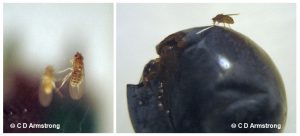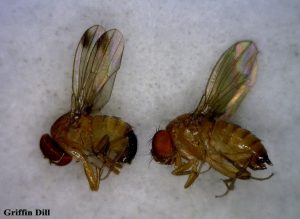It’s Fruit Fly Season (each Fall)

Jim Dill, a pest management specialist with the University of Maine Cooperative Extension, spoke with the Bangor Daily News about fruit flies and what to do when they invade your kitchen. Fruit flies, also known as vinegar flies, are attracted to overripe fruits as well as yeast and cider-laden products, Dill said. At this time of year, when an abundance of fruits are in season locally, Dill said the population of fruit flies in the environment spikes. The flies make it into homes via the overripe fruit itself or through an open door or window, the BDN reported. “That bowl of apples might look good sitting on the counter this time of year, but if they get a little soft or get a bruise on them, it doesn’t take much [to attract fruit flies],” he said. While it’s “almost impossible” to prevent fruit flies from getting into your home, according to Dill, you can stop the flies from taking over your kitchen space by covering your trash and keeping all produce in the refrigerator or covered. Once inside, the only way to deal with fruit flies is to “trap them out,” Dill said, by keeping items they are attracted to out of reach and using homemade solutions, such as apple cider vinegar in the bottom of a bottle, to capture and kill the pests.

The Bangor Daily News also spoke with David Handley, a University of Maine Cooperative Extension specialist of vegetables and small fruits, for an article about the invasive spotted-wing drosophila’s harmful effects on late-season berries. With warm weather prolonging the viability of raspberries and strawberries, the high populations of spotted-wing drosophila being detected could ravish the berries before farmers get to them, according to Handley. While the common fruit fly uses decomposing skin of overripe fruit to lay its larvae and multiply within the fruit, the spotted-wing drosophila is able to pierce the skin of soft-skinned berries that haven’t fully ripened yet and lay eggs within the fruit, Handley said. “When you as a farmer go to pick your fruit, even though it’s barely ripe, it is turning to goo. The reason it has turned to goo is because the larvae in there have started to hatch and are feasting on the fruit,” Handley said. “Your fruit starts to melt away from the inside out.” Since the flies have only been detected in Maine in recent years, Handley said the problems they cause have “really changed the game” in terms of late-season berries. With the spotted-wing drosophila population normally building in August, early berries are generally safe, the article states. Mainebiz also cited the BDN report.
